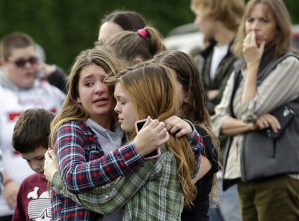
A mental health expert is calling for a national debate concerning the alarming number of young men resorting to gun violence in schools and encouraging families to fight the "troubling cultural trend."
Referencing the recent school shootings at Marysville Pilchuck High School and numerous others that have occurred over the past year, Dr. Gregory Jantz said that the United States is "truly experiencing a crisis."
"The conflux of modern behavioral phenomena - non-stop social media escalation and antagonism, with a huge increase in overall technology addictions - coupled with traditional factors of bullying and unrequited love can form a volatile environment," Dr. Jantz says, according to PRNewswire.
"But underlying all of this is a very troubling cultural trend that is producing disenfranchised, confused and violent boys and young men. At their earliest, formative ages, our society is condemning young boys' behavior. The result, as we are seeing in many of these boys, is that they reach their teenage and young adult years in massive confusion as to their identity and what are appropriate social norms. The tragic result is Marysville Pilchuck High School and so many other recent horrors. Our hearts ache for the families affected. We truly are experiencing a crisis in our country," Dr. Jantz continues.
Related: Internet Propaganda Cultivating Domestic Lone Wolf Terrorists
In making his case, Dr. Jantz pointed out some alarming statistics:
70% of D's and F's in school are given to boys
77% of expulsions are boys
80% of all disciplinary referrals are boys
67% of all children held back in class are boys
73% of children diagnosed with learning disabilities are boys
81% of suicides ages 10-19 are boys
80% of diagnosed behavioral disorders are boys
80% of children on Ritalin are boys (the U.S. consumes 80% of the world's Ritalin)
89% of incarcerated youths age 15-17 are males
33% of men aged 22-34 live at home with parents, a 100% increase in 20 years. No such increase has occurred for women
However, Dr. Jantz emphasizes that the root of the problem is not found in the boys, but in their family structures.
"We have created a culture that labels boys morally defective, hyper, undisciplined or 'problem children' when quite frequently the problem is not the boys but the family, our social environment, and our institutions that do not understand their specific needs and their brain chemistry," said Dr. Jantz, citing Raising Boys By Design, co-authored with brain science expert Michael Gurian.
"Limiting their natural development, and not understanding the difference in their brain make-up, has resulted in stunted behavioral growth. Condemning their actions during their early developmental years, and ending the discussion there, reinforces the message to them that their identity is confused and something for them to be ashamed of. Their resulting behavior can be shocking, as we are seeing."
"We must have this important national debate now. How do we reverse this alarming trend? There is a solution, but we must address it as a society."
Dr. Jantz encourages parents to discuss such violent occurrences with their children immediately.
"We cannot let this trauma turn into Post Traumatic Stress Disorder (PTSD) where it stays with children long-term. They will always have the memory, but it cannot be a memory that harms them," Dr. Jantz says, noting that parents must be sensitive about how they approach the subject.
"But we must deal with it. We need to make it a family discussion."
To help families get the discussion started, Dr. Jantz shares some resources such as an interview on Marysville Pilchuck High School shooting, and tips on how to talk about school shootings and violence with with kids.
In emphasizing the importance of working to prevent violence in young men, Dr. Jantz issued a solemn warning: "After almost two decades of working with boys and young men - in classrooms, in prisons, in community agencies, and in my therapy practice - my fear for them grows."






